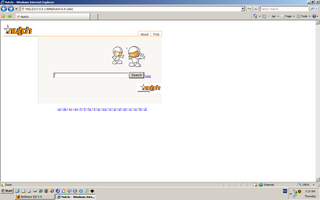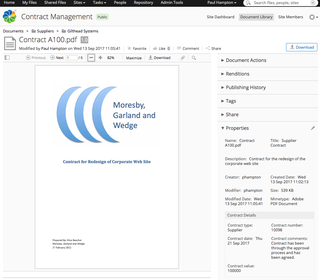
Apache Nutch is a highly extensible and scalable open source web crawler software project.
In text retrieval, full-text search refers to techniques for searching a single computer-stored document or a collection in a full-text database. Full-text search is distinguished from searches based on metadata or on parts of the original texts represented in databases.

Alfresco Software is a collection of information management software products for Microsoft Windows and Unix-like operating systems developed by Alfresco Software Inc. using Java technology. The software, branded as a Digital Business Platform is principally a proprietary & a commercially licensed open source platform, supports open standards, and provides enterprise scale. There are also open source Community Editions available licensed under LGPLv3.

Douglass Read Cutting is a software designer, advocate, and creator of open-source search technology. He founded two technology projects, Lucene, and Nutch, with Mike Cafarella. Both projects are now managed through the Apache Software Foundation. Cutting and Cafarella are also the co-founders of Apache Hadoop.

Solr is an open-source enterprise-search platform, written in Java. Its major features include full-text search, hit highlighting, faceted search, real-time indexing, dynamic clustering, database integration, NoSQL features and rich document handling. Providing distributed search and index replication, Solr is designed for scalability and fault tolerance. Solr is widely used for enterprise search and analytics use cases and has an active development community and regular releases.
A document-oriented database, or document store, is a computer program and data storage system designed for storing, retrieving and managing document-oriented information, also known as semi-structured data.
Coveo is a software-as-a-service (SaaS) search engine, powered by artificial intelligence based in Quebec, Canada. The Coveo Relevance Cloud offers ecommerce, customer service, digital workforce, and website search.
Vector space model or term vector model is an algebraic model for representing text documents as vectors such that the distance between vectors represents the relevance between the documents. It is used in information filtering, information retrieval, indexing and relevancy rankings. Its first use was in the SMART Information Retrieval System.
Pentaho is business intelligence (BI) software that provides data integration, OLAP services, reporting, information dashboards, data mining and extract, transform, load (ETL) capabilities. Its headquarters are in Orlando, Florida. Pentaho was acquired by Hitachi Data Systems in 2015 and in 2017 became part of Hitachi Vantara.

Elasticsearch is a search engine based on the Lucene library. It provides a distributed, multitenant-capable full-text search engine with an HTTP web interface and schema-free JSON documents. Elasticsearch is developed in Java and is dual-licensed under the source-available Server Side Public License and the Elastic license, while other parts fall under the proprietary (source-available) Elastic License. Official clients are available in Java, .NET (C#), PHP, Python, Ruby and many other languages. According to the DB-Engines ranking, Elasticsearch is the most popular enterprise search engine.

Sematext is a globally distributed organization that builds cloud and on-premises systems for application-performance monitoring, alerting, anomaly detecting, centralized logging, logging management, analytics, and real user monitoring. The company also provides search and Big Data consulting services and offers production support and training for Solr and Elasticsearch to clients. The company markets its core products to engineers and DevOps and its services to organizations using Elasticsearch, Solr, Lucene, Hadoop, HBase, Docker, Spark, Kafka and other platforms. Otis Gospodnetić founded Sematext. Sematext is headquartered in Brooklyn, NY, and is privately held.
Microsoft Azure Cognitive Search, formerly known as Azure Search, is a component of the Microsoft Azure Cloud Platform providing indexing and querying capabilities for data uploaded to Microsoft servers. The Search as a service framework is intended to provide developers with complex search capabilities for mobile and web development while hiding infrastructure requirements and search algorithm complexities. Azure Search is a recent addition to Microsoft's Infrastructure as a Service (IaaS) approach.
StormCrawler is an open-source collection of resources for building low-latency, scalable web crawlers on Apache Storm. It is provided under Apache License and is written mostly in Java.

Ontotext GraphDB is a graph database and knowledge discovery tool compliant with RDF and SPARQL and available as a high-availability cluster. Ontotext GraphDB is used in various European research projects.
OpenSearch is a family of software consisting of a search engine, and OpenSearch Dashboards, a data visualization dashboard for that search engine. The software started in 2021 as a fork of Elasticsearch and Kibana, with development led by Amazon Web Services.
Norconex Web Crawler is a free and open-source web crawling and web scraping Software written in Java and released under an Apache License. It can export data to many repositories such as Apache Solr, Elasticsearch, Microsoft Azure Cognitive Search, Amazon CloudSearch and more.






